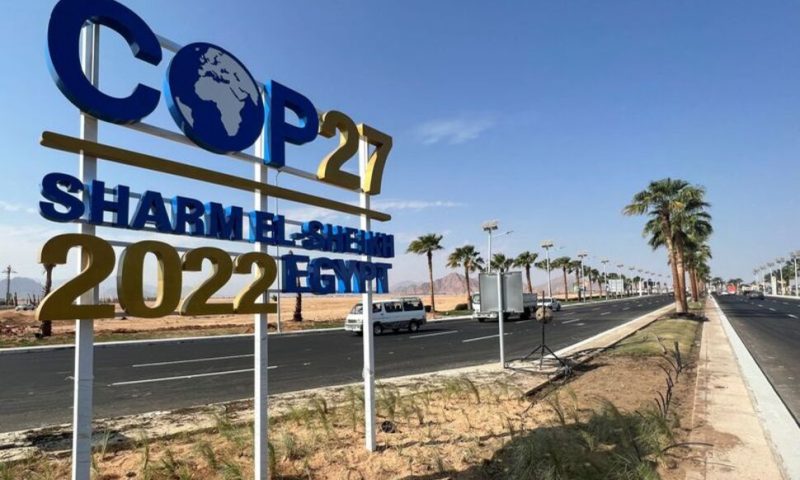CAIRO – The decision to hold next month’s COP27 climate summit in a highly secured tourist resort in Egypt, along with restrictions on access, is curbing civil society’s participation in the event, some prominent activists say.
The Nov. 6-18 summit in Sharm el-Sheikh is the first annual U.N. climate conference to be held after the easing of COVID-19 restrictions. Campaigners see it as a crucial venue for raising the alarm over climate change and pressuring governments to act.
But they say voicing their concerns through rallies and protests as they have done in past host countries or cities will be more challenging in Egypt, where public demonstrations are effectively banned and activists have struggled to operate legally amid a far-reaching crackdown on political dissent.
Limits on accreditation and attendance badges for activists, especially from poorer nations, have also been a point of contention at previous U.N. climate summits.
Egypt, which has just one non-governmental organisation permanently accredited to attend the annual summits, says inclusion of civil society is a priority, and it has helped add more NGOs including 35 Egyptian groups through a single-year admission valid only for COP27.
That was a positive step but the process was not publicly announced and did not give some groups a fair chance to apply, said Hossam Bahgat, head of the Egyptian Initiative for Personal Rights (EIPR) and one of Egypt’s best known campaigners.
“As a result, the list of accredited organisations does not include a single human rights organisation and none of the independent human rights groups in Egypt, including those that are working on the nexus of human rights, environmental justice and climate justice,” he said.
A spokesperson for Egypt’s COP presidency said in a written response to questions that there had been a “fully transparent” selection process approved by the U.N. after consultation with regional organisations and national negotiating teams.
Egyptian groups were recommended based on their environment and climate change expertise, the spokesperson said.
A U.N. climate change spokesman said there had been around 10,000 registrations from almost 2,000 admitted observer organisations for COP27, which was similar to COP26 in Glasgow.
CONCRETE BARRIER
Another concern among activists is the difficulty ordinary citizens may face accessing Sharm el-Sheikh. The city, situated at the southern tip of Egypt’s Sinai peninsula, is bordered by the sea on one side and a concrete and wire barrier in the desert on the other.
It is only reachable by air, or by roads studded with checkpoints that run north towards the Suez Canal, the border with Israel, and North Sinai, where Egyptian security forces have been waging a counter-insurgency campaign.
“It’s going to be virtually impossible for anyone who is not accredited for the conference itself to be able to access the city during the conference period,” said Bahgat, adding that activists were expecting a “significantly quieter and much more regulated” COP this year.
Some of those hoping to travel from outside Egypt have been put off by hotel prices that ran into hundreds of dollars per night earlier in the year.
After lobbying from civil society, the government negotiated a $120 price cap for two-star hotels and announced cheaper accommodation in recent weeks.
That included rooms for 400 young people at about $30-40 a night, and was designed to help African groups overcome long-standing obstacles to accessing COP summits, said Omnia el-Omrani, COP27’s youth envoy.
Omar Elmawi, an East African climate campaigner and member of the COP27 Coalition who has sought a visa to travel to the summit, said the offer of cheaper accommodation had been too slow to arrive.
“We’re still in this big problem around access for our people from Africa,” he said, citing flight and hotel costs and uncertainty over visas as barriers to attendance. A highly regulated summit could limit the airing of “the really hard questions that need to be asked”, he said.
Egyptian officials have said hotel prices are driven by market forces and peaceful protests will be welcomed during the summit, with designated spaces created for them.
The COP27 presidency was doing what it could to ensure such spaces were “visible and in the vicinity of the conference, provided with all services including drinking water and shades”, the presidency spokesperson said. Those wishing to hold a rally should coordinate “with the relevant authorities as soon as possible”, they added.
But this month a group of independent experts appointed by the United Nations Human Rights Council warned that past crackdowns on NGOs and activists had created a “climate of fear”, and called on Egypt to ensure safe and meaningful participation for civil society at COP27.
A petition led by 12 Egypt-focussed rights groups has called on Egypt to address restrictions on civil society, saying “effective climate action is not possible without open civic space”.
Because of the lack of local residents in the remote tourist resort, a traditional “global day of action” during the summit would be marked elsewhere around the world but not in Sharm el-Sheikh, said Tasneem Essop, head of the Climate Action Network, which includes more than 1,500 civil society groups.
“Certainly we’re very alive to the fact that Sharm el-Sheikh is an enclosed space, very controlled, very curated,” she said.

